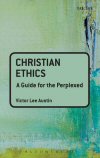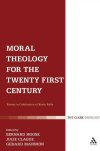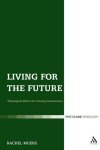T&T Clark Ethics Studies (4 Vols.)
Digital Logos Edition
Overview
The T&T Clark Studies in Ethics collection offers a helpful overview of the field, as well as cutting-edge research on various ethical issues. It discusses general approaches to ethics and paves new roads in ethical thought. In Christian Ethics: A Guide for the Perplexed, Victor Lee Austin helps untangle the knotty field of ethics, presenting it clearly and cogently without sacrificing comprehensiveness and serving as a guide for the newcomer and seasoned expert alike. Moral Theology for the Twenty First Century presents a collection of essays from some of the foremost experts in ethics, addressing many of today’s most pressing ethical issues. In his provocative , Ecclesial Repentance, Jeremy M. Bergen discusses the concept of church repentance for ideologies and actions in its past. Finally, in Living for the Future, Rachel Muers pioneers future-oriented ethics that incorporates a consideration of later generations.
The Logos Bible Software editions of these volumes are designed to enhance and streamline your study and understanding of ethics. Scripture passages link directly to your English translations and original-language texts, and important theological concepts link to dictionaries, encyclopedias, and a wealth of other resources in your digital library. In addition, you can perform powerful searches by topic and find what other authors, scholars, and theologians have to say about things like natural law, moral theology, and Christian ethics.

Key Features
- An accessible yet comprehensive overview of Christian ethics
- Contemporary and timely treatments of significant ethical issues
- In-depth, scholarly analysis of moral theology and ethics
Product Details
- Title: T&T Clark Studies in Ethics
- Publisher: T&T Clark
- Volumes: 4
- Pages: 1,104
Individual Titles
- Christian Ethics: A Guide for the Perplexed by Victor Lee Austin
- Moral Theology for the Twenty First Century: Essays in Celebration of Kevin T. Kelly edited by Bernard Hoose, Julie Clague, and Gerard Mannion
- Ecclesial Repentance: The Churches Confront Their Sinful Pasts by Jeremy M. Bergen
- Living for the Future: Theological Ethics for Coming Generations by Rachel Muers

Christian ethics is a most perplexing subject. This guide takes the reader through the most fundamental issues surrounding the question of ethics from a Christian perspective by raising significant questions and offering cogent answers. Is ethics a meaningful topic of discourse and can there be such a thing as an ethical argument or ethical persuasion? What is the meaning of “Christian ethics?” Could right behavior be different for Christians than it is for others? How does the content of the Bible inform Christian ethics? Is it best to think of ethics as a matter of duty, good, or excellence? These and other issues are clearly discussed in this succinct guide.
Austin’s Guide is a rare combination: a broad, sophisticated introduction to the vast universe of Christian ethics, but one that is energized by a constant stream of engaging prose and arresting examples. The text is even-handed and truly comprehensive in its scope, avoiding privileging any one school of ethics. And Austin’s eye for the extraordinary in the ordinary shines especially in the final chapters on the moral challenges of friendship and disability.
—David Cloutier, associate professor of theology, Mount St. Mary’s University
Austin has done a great service for the ‘perplexed’ by offering an accessible, conversational, and cogent introduction to Christian ethics. The text is comprehensive and simple, without at all being simplistic. Those knowledgeable in the field will discern how carefully Austin presents Christian ethics, in a manner informed by, even if not weighed down by, current scholarship. Those unaware of such research can trust they encounter in this book a reliable and trustworthy guide to the Christian moral life, a true scholar who invites his readers to understand the Christian life as not only accessible . . . but also as attractive and vivifying.
—William C. Mattison III, assistant professor of theology, The Catholic University of America
With glad and generous confidence in the distinction of Christian ethics, Austin guides his readers into this subject. The simplicity and clarity of his style hold many points for deeper thoughtful reflection, and one senses too, for the reader to be moved towards a fuller humanity through what is absorbed here.
—Susan F. Parsons, editor, Studies in Christian Ethics
Victor Lee Austin is theologian-in-residence at Saint Thomas Church Fifth Avenue in New York City. He is the author of Up with Authority and has written scholarly articles in political theology, ecclesiology, and social ethics, as well as a book of theological meditations on everyday life, A Priest’s Journal.

This book is a tribute to Kevin Kelly, who has been one of the most influential British theologians for a number of decades. On its own merits, however, it is a groundbreaking collection of essays on key themes, issues, and concepts in contemporary moral theology and Christian ethics. It focuses on perspectives to inform moral debate and discernment in the future. Some of the main themes covered include hospitality, medical and sexual ethics, bioethical issues such as the moral status of the unborn, and animal ethics. The contributors represent an international collaboration and many are among the best known in their fields on both sides of the Atlantic.
As a public voice honoring the life and work of Kevin Kelly, this collection raises the bar on what such festschriften can achieve . . . This festschrift not only introduces readers to Kelly’s wide range of influence . . . , but it also suggests that members of the guild commit to dialogically probe the depths of the tradition, to bring more experiences to the table, and to collaborate in finding what matters most in and for the real world.
—Theological Studies
This collection offers meaningful theological reflection and insights for undertaking moral theology in the twenty-first century.
—Worship
The book’s unity and strength arise from several elements. Most of the essays in some way challenge the magisterial status quo and all of them reflect directly or indirectly Kelly’s concerns and influence. Most importantly, however, the essays share a pastoral sensibility—a concern for the person that is stronger than the concern for doctrinal purity—that derives from Kelly himself. The challenges to the church’s treatment of, for instance, the AIDS crisis and its attending controversies are rooted in the actual lives of those most affected. Kelly’s conviction that the moral theologian must work with the heart of a pastor is evident throughout the book. No prior familiarity with Kelly’s work is necessary to learn from these essays, but it is unlikely that many will finish the book without then reaching soon for Kelly’s own work.
—Anglican Theological Review
As such, the volume includes rigorous, pastorally-sensitive essays on a multitude of specific areas: sexual complementarity, contraception, homosexuality, animal ethics, HIV/AIDS, ecclesiological issues such as ecumenism, and many more. Usefully, however, it also contains what might be called meta-ethical reflections, such as those on the nature of conscience, doctrine, and moral theology itself.
—Reviews in Religion and Theology
Bernard Hoose lectures in Christian Ethics at Heythrop College in the University of London. His publications include Proportionalism: The American Debate and its European Roots and Received Wisdom? Reviewing the Role of Tradition in Christian Ethics. He is editor of Christian Ethics: An Introduction, Authority in the Roman Catholic Church, and Authority in Roman Catholicism. He presently serves on the Theology Commission of Caritas-Social Action.
Julie Clague is a lecturer in Catholic theology at the University of Glasgow. She has written numerous articles and has been co-editor of the journal Feminist Theology since 1993. She has also been co-editor of the journal Political Theology since 2005. She serves on the steering committee of the American Academy of Religion: Ecclesiological Investigations Program unit, and is an elected member of the Niebuhr Society. Dr. Clague is also a founding member of the International Association for Catholic Social Thought, and a member of the Theological Commission of the Catholic Bishops’ Conference of England and Wales agency. Additionally, she works as a theologian with the Catholic international aid agencies CAFOD and SCIAF and serves on the theological panel of the Centre for Theology and Public Issues at Edinburgh University. Dr. Clague is also the chairperson of the Ethics Committee of the Assisted Conception Service of Greater Glasgow NHS Trust.
Gerard Mannion is director of the Centre for Catholic Thought and Culture and professor of theology and religious studies at the University of San Diego.

A theological reflection on churches repenting of events and convictions they have held in the past. Part one describes ecclesial repentance by “breadth” and “depth.” Specifically, it discusses actions of the church against the unity of the church itself and the Jewish people. Then the “Western colonial project” is examined with its attendant oppression of subjugated peoples. Bergen then moves on to address issues like clergy sexual abuse, the crusades, science, ecological matters, and Pope John Paul II’s Day of Pardon. In part two, Bergen argues that “ecclesial repentance reflects the church’s nature and mission” and can contribute to broader social reconciliation.
Should the church—can the church—repent? How can the living be held responsible for the faults of past generations? If the church is constantly ‘apologizing’ for everything imaginable, does she not risk trivializing herself? In this remarkable book, Jeremy Bergen displays a sure hand in addressing questions like these. It is not political correctness that bids the church repent, he argues, but love of neighbor and fidelity to the Crucified. An important and timely study.
—Joseph Mangina, Wycliffe College, Toronto School of Theology
This is a wonderful example of systematic ecclesiological inquiry that is disciplined both by faithful dialogue with the doctrinal tradition and by critical engagement with what churches and church people are actually doing. In the first part of the book, Bergen presents an immensely helpful analytic description and assessment of a wide range of concrete examples of acts of apology and repentance performed in recent years by churches, governments, and other groups, together with their varied receptions. Reflecting upon this material in the second part, he constructs a bold yet deeply thoughtful ecclesiological proposal that deserves careful consideration, not least for its ecumenical benefits. Particularly significant is his proposal that the Church’s continuity over time derives not from claims about some ideal or institutional element. Rather, he reworks the creedal ‘communion of saints’—and sinners!—to argue that it is these practices of repentance and forgiveness, enabled by the Holy Spirit, that enable us both to appropriate our churches’ pasts and be drawn up in Christ into the life of God. It is thus ‘through repentance that the Church may be granted a share of its own continuity in God’s triune life,’ and thus truly be the Church.
—Nicholas Healy, assistant chair and professor of theology and religious studies, St. John’s University
With grace, courage, and a discerning spirit, Jeremy Bergen offers an account of ecclesial repentance worthy of a pilgrim people, a church at once reconciled and always on the journey toward full reconciliation. Christian communities would do well to use this volume in a process of communal examination of conscience.
—Margaret Pfeil, Theology Department, University of Notre Dame
Jeremy M. Bergen earned his PhD from the University of St. Michael’s College and is assistant professor of religious studies and theology at Conrad Grebel University College at the University of Waterloo in Canada.

Our relationship to future generations raises fundamental issues for ethical thought, to which a Christian theological response is both possible and significant. A relationship to future generations is implicitly central to many of today’s most public controversies—environmental protection, genetic research, and the purpose of education, to name but a few—but it has received little explicit or extended consideration.
In Living for the Future, Rachel Muers argues that to consider future generations as ethically significant is not simply to extend an existing ethical framework, but to rethink how ethics is done. Doing intergenerationally responsible theology and ethics means paying attention to how people are formed as theological and ethical reasoners, how social practices of deliberation about the good are maintained and developed, and how all of this relates to an understanding of the world as the sphere of God’s transforming action. In other words, an intergenerationally responsible theological ethics will pay attention to the ethics, and the spirituality, of “ethics” itself.
Her account of the ethical relation to future generations centers on three key concepts: “choosing life” (Deut. 30:19), “keeping the sources open,” and “sustaining fruitful contexts.” These concepts are developed theologically and in engagement with extra-theological conversations on intergenerational responsibility.
Rachel Muers has initiated a new subfield of theological ethics: ‘the Ethics of Intergenerational Responsibility.’ Muers renews the Enlightenment’s call for us to reason for the sake of future generations. Then she reminds us that the Enlightenment is indebted to previous as well as future generations. The result is a much more radical call: back to the scriptural as well as philosophic sources of modern ethics and forward to a vision of how ‘God constitutes intergenerational communities.’ It is at once a maternal, theocentric, and eco-centric vision. A thoroughly refreshing approach. Living for the Future should become a primary source for future work on intergenerational matters.
—Peter Ochs, Edgar Bronfman Professor of Modern Judaic Studies, University of Virginia
Living for the Future is a timely and compelling inquiry into the subject of intergenerational responsibility that calls Christian people to practices of hope ‘for the third and fourth generation.’ By developing maternal ways of thinking sensitive to asymmetrical relations with future generations, Rachel Muers offers a deeply considered exploration of moral issues entailed in safeguarding the future. This book is insightful, biblically-informed, and fully engaged with the realities of today’s world. Muers writes the best kind of systematic theology—exegetical, provocative, and clear.
—Esther D. Reed, head of theology and religion, University of Exeter
Creative and timely insights.
—Baptist Times
Rachel Muers is lecturer in theology in the University of Leeds. She is author of Keeping God’s Silence: Towards a Theological Ethics of Communication. She also coedited The Modern Theologians.